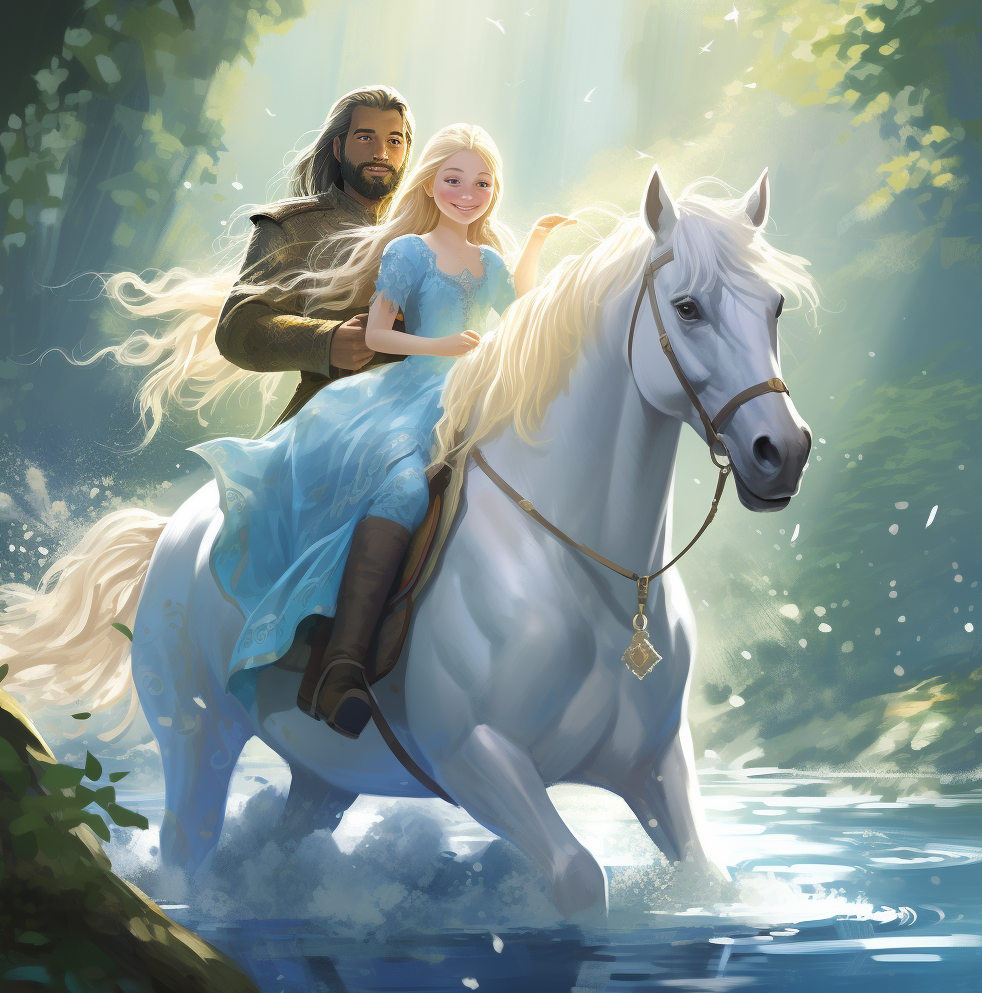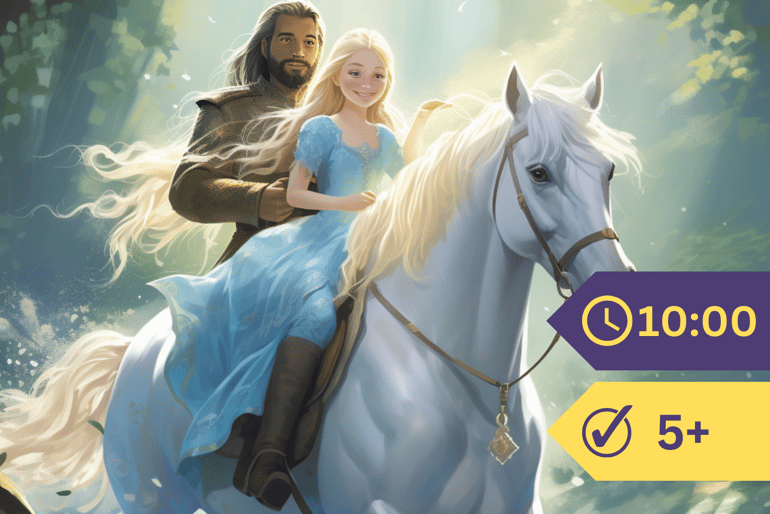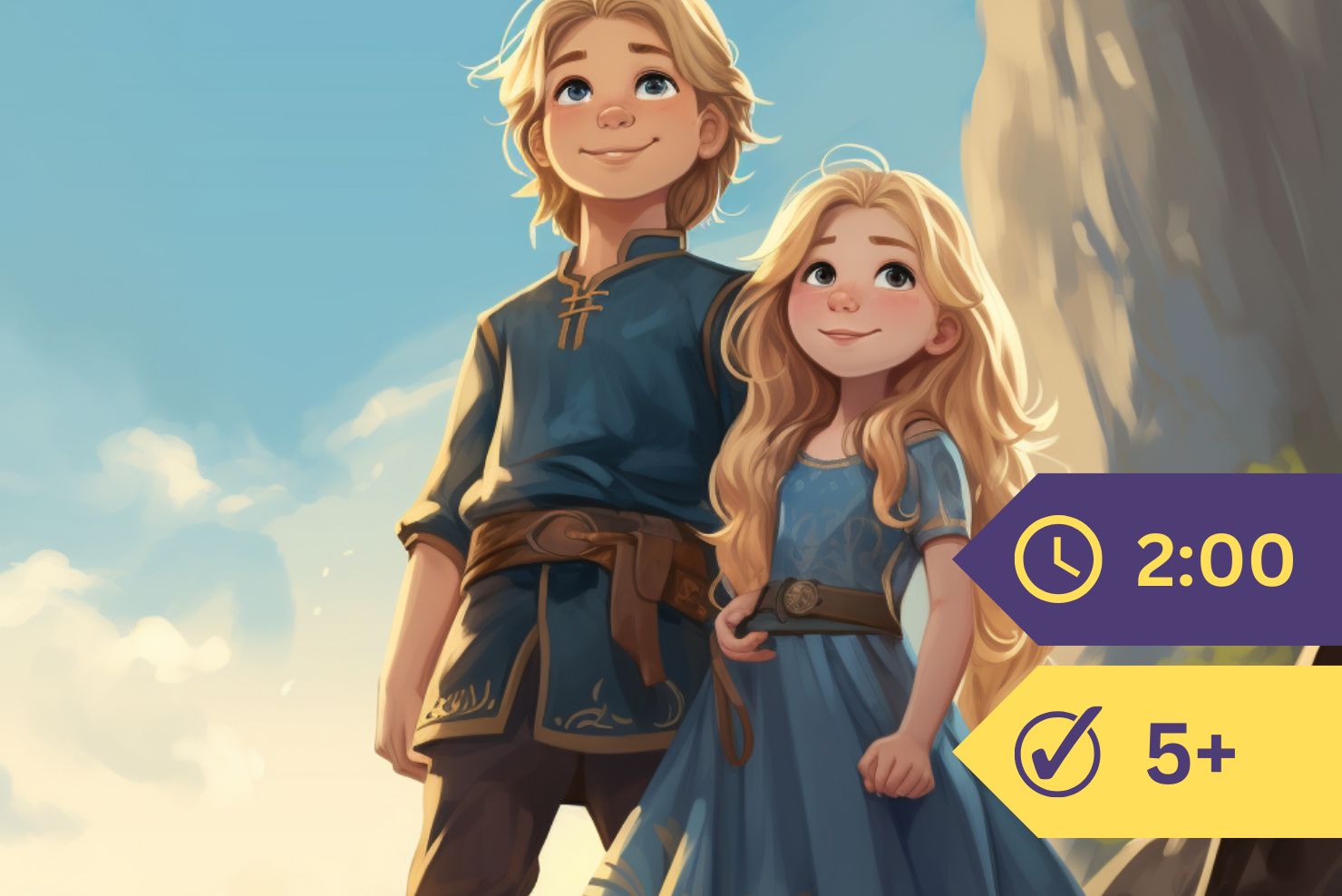The king’s harper, who always formed a part of his escort, was chanting a ballad which he made as he went on playing on his instrument—about the princess and the goblins, and the prowess of Curdie, when all at once he ceased, with his eyes on one of the doors of the hall. Thereupon the eyes of the king and his guests turned thitherward also. The next moment, through the open doorway came the princess Irene. She went straight up to her father, with her right hand stretched out a little sideways, and her forefinger, as her father and Curdie understood, feeling its way along the invisible thread. The king took her on his knee, and she said in his ear:
‘King-papa, do you hear that noise?’
‘I hear nothing,’ said the king.
‘Listen,’ she said, holding up her forefinger.
The king listened, and a great stillness fell upon the company. Each man, seeing that the king listened, listened also, and the harper sat with his harp between his arms, and his finger silent upon the strings.
‘I do hear a noise,’ said the king at length—’a noise as of distant thunder. It is coming nearer and nearer. What can it be?’
They all heard it now, and each seemed ready to start to his feet as he listened. Yet all sat perfectly still. The noise came rapidly nearer.
‘What can it be?’ said the king again.
‘I think it must be another storm coming over the mountain,’ said Sir Walter.
Then Curdie, who at the first word of the king had slipped from his seat, and laid his ear to the ground, rose up quickly, and approaching the king said, speaking very fast:
‘Please, Your Majesty, I think I know what it is. I have no time to explain, for that might make it too late for some of us. Will Your Majesty give orders that everybody leave the house as quickly as possible and get up the mountain?’
The king, who was the wisest man in the kingdom, knew well there was a time when things must be done and questions left till afterwards. He had faith in Curdie, and rose instantly, with Irene in his arms. ‘Every man and woman follow me,’ he said, and strode out into the darkness.
Before he had reached the gate, the noise had grown to a great thundering roar, and the ground trembled beneath their feet, and before the last of them had crossed the court, out after them from the great hall door came a huge rush of turbid water, and almost swept them away. But they got safe out of the gate and up the mountain, while the torrent went roaring down the road into the valley beneath.
Curdie had left the king and the princess to look after his mother, whom he and his father, one on each side, caught up when the stream overtook them and carried safe and dry.

When the king had got out of the way of the water, a little up the mountain, he stood with the princess in his arms, looking back with amazement on the issuing torrent, which glimmered fierce and foamy through the night. There Curdie rejoined them.
‘Now, Curdie,’ said the king, ‘what does it mean? Is this what you expected?’
‘It is, Your Majesty,’ said Curdie; and proceeded to tell him about the second scheme of the goblins, who, fancying the miners of more importance to the upper world than they were, had resolved, if they should fail in carrying off the king’s daughter, to flood the mine and drown the miners. Then he explained what the miners had done to prevent it. The goblins had, in pursuance of their design, let loose all the underground reservoirs and streams, expecting the water to run down into the mine, which was lower than their part of the mountain, for they had, as they supposed, not knowing of the solid wall close behind, broken a passage through into it. But the readiest outlet the water could find had turned out to be the tunnel they had made to the king’s house, the possibility of which catastrophe had not occurred to the young miner until he had laid his ear to the floor of the hall.
What was then to be done? The house appeared in danger of falling, and every moment the torrent was increasing.
‘We must set out at once,’ said the king. ‘But how to get at the horses!’
‘Shall I see if we can manage that?’ said Curdie.
‘Do,’ said the king.
Curdie gathered the men-at-arms, and took them over the garden wall, and so to the stables. They found their horses in terror; the water was rising fast around them, and it was quite time they were got out. But there was no way to get them out, except by riding them through the stream, which was now pouring from the lower windows as well as the door. As one horse was quite enough for any man to manage through such a torrent, Curdie got on the king’s white charger and, leading the way, brought them all in safety to the rising ground.
‘Look, look, Curdie!’ cried Irene, the moment that, having dismounted, he led the horse up to the king.
Curdie did look, and saw, high in the air, somewhere about the top of the king’s house, a great globe of light shining like the purest silver.
‘Oh!’ he cried in some consternation, ‘that is your grandmother’s lamp! We must get her out. I will go an find her. The house may fall, you know.’
‘My grandmother is in no danger,’ said Irene, smiling.
‘Here, Curdie, take the princess while I get on my horse,’ said the king.
Curdie took the princess again, and both turned their eyes to the globe of light. The same moment there shot from it a white bird, which, descending with outstretched wings, made one circle round the king an Curdie and the princess, and then glided up again. The light and the pigeon vanished together.
‘Now, Curdie!’ said the princess, as he lifted her to her father’s arms, ‘you see my grandmother knows all about it, and isn’t frightened. I believe she could walk through that water and it wouldn’t wet her a bit.’
‘But, my child,’ said the king, ‘you will be cold if you haven’t Something more on. Run, Curdie, my boy, and fetch anything you can lay your hands on, to keep the princess warm. We have a long ride before us.’
Curdie was gone in a moment, and soon returned with a great rich fur, and the news that dead goblins were tossing about in the current through the house. They had been caught in their own snare; instead of the mine they had flooded their own country, whence they were now swept up drowned. Irene shuddered, but the king held her close to his bosom. Then he turned to Sir Walter, and said:
‘Bring Curdie’s father and mother here.’
‘I wish,’ said the king, when they stood before him, ‘to take your son with me. He shall enter my bodyguard at once, and wait further promotion.’
Peter and his wife, overcome, only murmured almost inaudible thanks. But Curdie spoke aloud.
‘Please, Your Majesty,’ he said, ‘I cannot leave my father and mother.’
‘That’s right, Curdie!’ cried the princess. ‘I wouldn’t if I was you.’
The king looked at the princess and then at Curdie with a glow of satisfaction on his countenance.
‘I too think you are right, Curdie,’ he said, ‘and I will not ask you again. But I shall have a chance of doing something for you some time.’
‘Your Majesty has already allowed me to serve you,’ said Curdie.
‘But, Curdie,’ said his mother, ‘why shouldn’t you go with the king? We can get on very well without you.’
‘But I can’t get on very well without you,’ said Curdie. ‘The king is very kind, but I could not be half the use to him that I am to you. Please, Your Majesty, if you wouldn’t mind giving my mother a red petticoat! I should have got her one long ago, but for the goblins.’
‘As soon as we get home,’ said the king, ‘Irene and I will search out the warmest one to be found, and send it by one of the gentlemen.’
‘Yes, that we will, Curdie!’ said the princess. ‘And next summer we’ll come back and see you wear it, Curdie’s mother,’ she added. ‘Shan’t we, king-papa?’
‘Yes, my love; I hope so,’ said the king.
Then turning to the miners, he said:
‘Will you do the best you can for my servants tonight? I hope they will be able to return to the house tomorrow.’
The miners with one voice promised their hospitality. Then the king commanded his servants to mind whatever Curdie should say to them, and after shaking hands with him and his father and mother, the king and the princess and all their company rode away down the side of the new stream, which had already devoured half the road, into the starry night.


